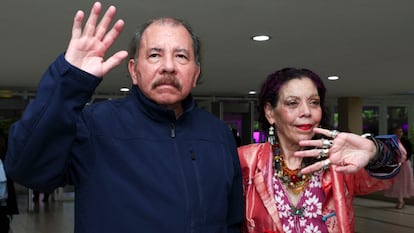Daniel Ortega and Rosario Murillo’s regime puts priests in the crosshairs at Christmas
At least 13 priests and two seminarians were arrested between December 20 and 30 in Nicaragua, among them Monsignors Carlos Avilés, Silvio Fonseca, Miguel Mántica, and Father Pablo Villafranca


The police working for Daniel Ortega and Rosario Murillo’s regime have attacked the Catholic Church at Christmas. Between December 20 and 30, 13 priests and two seminarians were arrested, among them priests known as Monsignors Carlos Avilés, Silvio Fonseca, Miguel Mántica, and Father Pablo Villafranca. These arrests are added to the conviction of Bishop Rolando Álvarez and the head of the diocese of Siuna, Isidro Mora Ortega.
“This week the Sandinista dictatorship has unleashed a fierce hunt against priests, taking several of them to prison, adding to two bishops who were already imprisoned,” said the auxiliary bishop of Managua, Silvio Báez, who is exiled in the United States. “I beg the bishops and the episcopal conferences of the world not to abandon us at this time, to pray for the Church of Nicaragua, and to show solidarity and raise their voices to denounce the dictatorship’s persecution against our Church!”
At dawn on December 30, clergy belonging to the Archdiocese of Managua were detained, including Monsignor Mántica, priests Gerardo Rodriguez, Jader Hernández, and Raúl Zamora. The latter is the parish priest of the Iglesia Divina Misericordia, the church that was raided by Sandinista paramilitaries on July 13, 2018. It was a brutal attack that lasted hours. The assault came within the framework of the so-called Operation Cleanup, when the government ordered the dismantling of protesters’ barricades. The security forces open fire, killing two university students, Geral Vásquez and Francisco Flores. Some of the priests who are now persecuted and imprisoned had participated as mediators in the failed national dialogue process between the Sandinista Government and the opposition.
Monsignor Silvio Fonseca, vicar of Family, Life, and Childhood in the Archdiocese of Managua, was another of those kidnapped by police officers on the night of Friday, December 29. Silvio Fonseca is an open critic of the president and his wife and has accused them of “promoting a hatred never seen before” against the Catholic Church, and of “depriving the Catholic people of being formed in their faith.”
The other religious figures arrested in December are Monsignor Marcos Diaz (León), Fernando Calero (Matagalpa), Héctor Treminio Vega Managua), Mykel Monterrey (Managua). Gerardo Rodríguez (Managua). There are also other seminarians not identified by the Blue and White Monitoring organization that is documenting Ortega’s repression.
“The arrests of priests hinder the free and fearless exercise of faith in Nicaragua. Freedom of worship and thought are fundamental pillars in a plural and democratic society. Protecting them is essential to fostering an inclusive and respectful society. The arrest of these 14 clerics adds to the political condemnation against the bishop of Matagalpa, Rolando Álvarez, and Monsignor Isidoro Mora, head of the diocese of Siuna,” the Legal Defense Unit (UDJ) that defends political prisoners stated.
From 2018 to 2023, the Catholic Church has endured 740 attacks, according to researcher and lawyer Martha Patricia Molina, author of the study Nicaragua: a persecuted Church. “In 2023 alone, 275 attacks were carried out. We can describe this last year as the year with the most attacks against the Catholic Church in the recent five years. Furthermore, 176 religious men and women are not exercising their ministry in Nicaragua because they were expelled, prohibited from entering the country, or sent into exile,” says the jurist who is exiled herself.
Policía sandinista secuestra al Padre Mykel Monterrey, párroco de Ntra. Sra de Candelaria. Arquidiócesis de Managua#Iglesiaperseguidani pic.twitter.com/60z2Uee4QK
— Martha Patricia M (@mpatricia_m) December 30, 2023
The most recent banishment of priests occurred last October, when the Central American country’s regime removed a dozen priests it held as political prisoners from its prisons and put them on a plane to Rome. However, the expulsion of clerics began in 2018, when the Ortega-Murillos forced the exile of the auxiliary bishop of Managua, Monsignor Silvio Báez, one of the most critical pastoral voices against the authoritarian drift and human rights violations in Nicaragua. Father Edwin Román, a parish priest who was key in protecting citizens from repression in the city of Masaya during the 2018 protests, was also exiled.
“We strongly condemn these repressive acts and call for international solidarity. We demand the immediate release of priests, seminarians, and bishops, as well as the cessation of any form of persecution against the Church. We urge global leaders to unite in denouncing these crimes and exert diplomatic pressure to end this escalation of violence. The international community must urgently direct its attention to the growing threat to religious freedom in Nicaragua,” said the group of opponents brought together in the Monteverde Reconciliation process.
In a timeline carried out by EL PAÍS on the persecution against Catholicism, there were attacks against priests and bishops, desecrations of churches, closures of media outlets and NGOs managed by the dioceses, freezing of bank accounts, and a sustained narrative against the Catholicism and its hierarchies. For example, on January 24, 2022, “co-president” Rosario Murillo attacked the priests, calling them “retarded and backward,” adding that they “disguise themselves with masks and supposedly elegant costumes.”
Sign up for our weekly newsletter to get more English-language news coverage from EL PAÍS USA Edition
Tu suscripción se está usando en otro dispositivo
¿Quieres añadir otro usuario a tu suscripción?
Si continúas leyendo en este dispositivo, no se podrá leer en el otro.
FlechaTu suscripción se está usando en otro dispositivo y solo puedes acceder a EL PAÍS desde un dispositivo a la vez.
Si quieres compartir tu cuenta, cambia tu suscripción a la modalidad Premium, así podrás añadir otro usuario. Cada uno accederá con su propia cuenta de email, lo que os permitirá personalizar vuestra experiencia en EL PAÍS.
¿Tienes una suscripción de empresa? Accede aquí para contratar más cuentas.
En el caso de no saber quién está usando tu cuenta, te recomendamos cambiar tu contraseña aquí.
Si decides continuar compartiendo tu cuenta, este mensaje se mostrará en tu dispositivo y en el de la otra persona que está usando tu cuenta de forma indefinida, afectando a tu experiencia de lectura. Puedes consultar aquí los términos y condiciones de la suscripción digital.








































